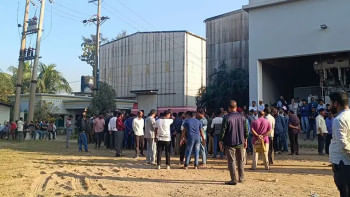BB won’t print taka or sell dollar to tackle crisis

The central bank will not print money or sell dollars from reserves to solve the problems in the financial sector, said its governor Ahsan H Mansur yesterday.
Now, efforts are being made to provide funds from other banks to those in need of liquidity, he said at a roundtable discussion styled "Where do we want to see the banking sector?" organised by Bangla daily Prothom Alo at its office in Dhaka.
"This step will play a role in controlling inflation. If you can reduce people's anger and suffering, it will be a great achievement. Even if temporary relief is obtained by printing money, the problem will not be solved. Human suffering will increase."
Subsequently, the Bangladesh Bank has decided not to print money or sell dollars from the reserves.
Even though there will be temporary difficulties in the business sector due to the strict monetary policy taken to bring down inflation, it will benefit the overall economy.
"Reducing inflation is my main responsibility. Various measures are being taken to reduce it. Monetary policy is already tight and steps are being taken for further tightening."
When inflation will come down, the overall economy will benefit as a result, said Mansur, also a former economist of the International Monetary Fund.
Mansur, who took over the reins of the central bank from Abdur Rouf Talukder last month, is planning to form three task forces to reform the banking sector and one of them has already been constituted.
Besides, several measures have already been taken, including changing the board of directors of some banks.
About 10 to 11 weak banks have been brought under regular supervision to improve the situation.
"We have already started daily monitoring, checking daily transitions and all other activities. After taking these steps, the deposits in the crisis-hit banks increased by Tk 400 crore on Monday. It is a matter of great relief. Once the liquidity crisis is over, we will move on to the next course of action."
If the depositors of Islami banks keep their patience for a year, all problems, including those related to the liquidity crisis, will be solved, Mansur said.
About the foreign exchange market, he said: "The way the dollar market is going, if it continues this way, there will be no more instability in the market. This is the first time that the dollar price in the kerb market is lower than interbank forex market."
Bad loans are another problem for the country, said Monzur Hossain, research director of the Bangladesh Institute of Development Studies (BIDS).
"If the issue of defaulted loans is not fixed, there will be an imbalance in the monetary policy. The 10-12 percent defaulted loan figure that is currently being talked about is not credible. Therefore, it is necessary to clearly state the amount of defaulted loans," he said.
AK Azad, former president of the Federation of Bangladesh Chambers of Commerce and Industry (FBCCI), urged the governor not to increase the policy rate and interest rate, saying that such a step would hit the businesses adversely and bring down the country's export earnings.
In response, Mansur said the 9-6 percent policy rates (the lending and deposit rates respectively) were introduced in the past but it could not increase export; rather it has fuelled inflation.
Talking about previous mismanagement of the Bangladesh Association of Banks (BAB), Romo Rouf Chowdhury, the newly-elected vice-chairman of BAB, said if an association is occupied by one man for 17 years, there cannot be an effective association at all.
"We will establish it as an association, make it functional and inclusive. We are going to have some sub-committees. Among them, there will be a subcommittee for reform and a subcommittee for policy."
The banking sector seems to be the most uncompetitive sector, said Chowdhury, also the chairman of Bank Asia.
Matiur Rahman, editor of Prothom Alo; Fahmida Khatun, executive director of Centre for Policy Dialogue; Mohammad Abdul Mannan, chairman of First Security Islami Bank; Ali Reza Iftekhar, managing director of Eastern Bank; Aziz Al Kaiser, chairman of City Bank; Humaira Azam, managing director of LankaBangla Finance; Shah Md Ahsan Habib, professor of Bangladesh Institute of Bank Management; and Rushad Faridi, assistant professor of economics at Dhaka University, also spoke.


 For all latest news, follow The Daily Star's Google News channel.
For all latest news, follow The Daily Star's Google News channel. 



Comments